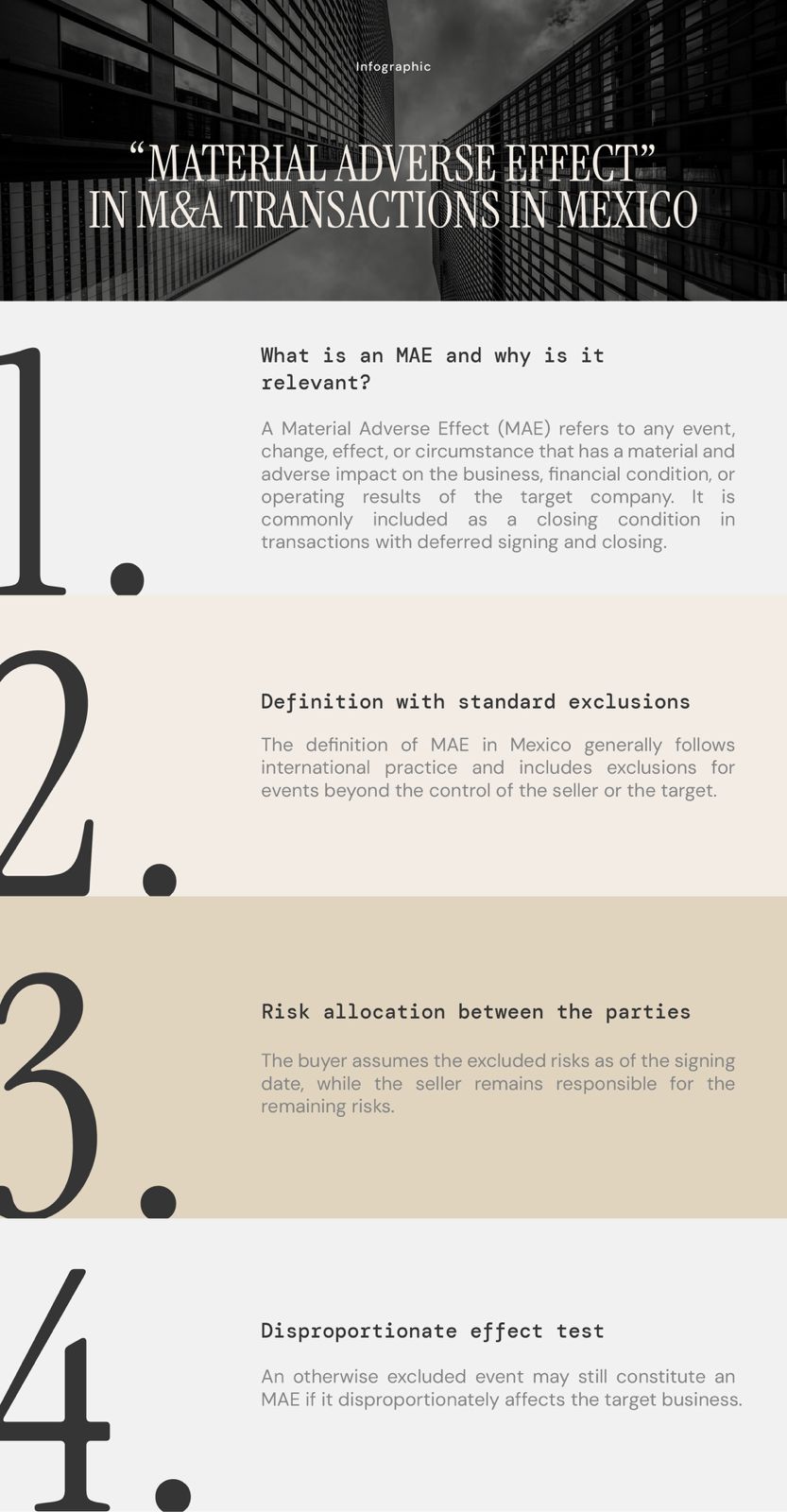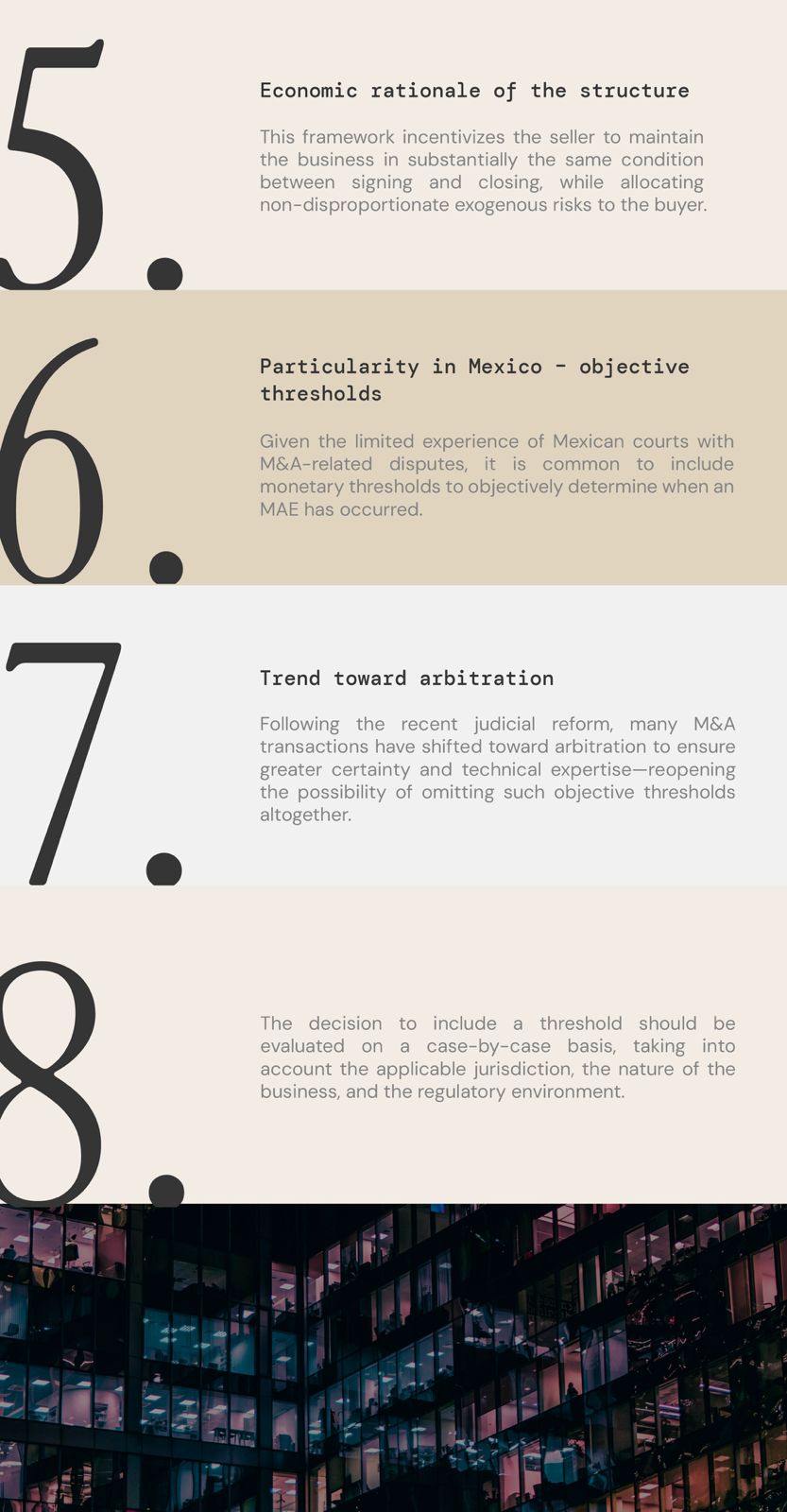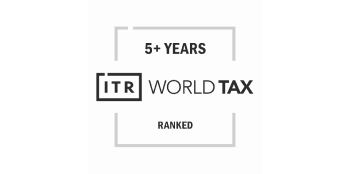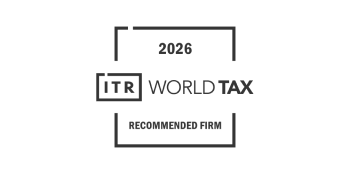


In mergers and acquisitions (M&A) transactions in Mexico where closing occurs after signing (deferred closing), buyers typically include as a condition to closing that no material adverse effect (MAE) has occurred in the target business between the signing of the agreement and the closing date.
The concept of MAE refers to any event, circumstance, change, or effect that has a material and adverse impact on the business, financial condition, or results of operations of the target business. In Mexico, the concept of MAE is generally defined in the same manner as in other jurisdictions, using the definition described above (i.e., “a material and adverse event affecting the business, operations, financial condition, etc.”) and including a series of carve-outs from such definition. These carve-outs typically consist of events outside the control of the seller or the management of the company and can include macroeconomic or industry-wide events, natural disasters, wars, pandemics, terrorist attacks, changes in law or accounting standards, and the effects of the transaction announcement itself. The rationale behind these exclusions is that the buyer is willing to assume such risks of the target as of the signing date, which, but for third-party actions or authorizations required to close the transaction, the buyer would already be assuming at signing. Conversely, any act or event within the control of the seller would not fall under these exclusions and, therefore, could qualify as an MAE. This consideration also underpins the inclusion of the disproportionality test often applied to the exclusions, under which it is assumed that acts or omissions by the seller or the company’s management result in the target being disproportionately affected, thereby allowing the buyer to opt not to close.
It is worth noting that this risk allocation structure is efficient from an economic perspective, as it incentivizes the seller to maintain the target substantially in the same condition during the period between signing and closing while assigning the aforementioned risks to the buyer.
The key distinction between Mexico and the United States on this topic is that in Mexico, it is common to seek to include objective or monetary thresholds within the definition of MAE. In other words, the assessment of what constitutes an “adverse” effect on the company or business is tied to an objective monetary threshold. The principal reason for this approach is that the Mexican judiciary does not yet have extensive familiarity with disputes arising from M&A transactions, which may result in decisions by judges that are inconsistent with the significance the MAE concept has acquired in global M&A practice.
As a result of the disputes triggered by the recent Constitutional Reform on the Federal Judiciary, which entered into force on September 16, 2024, in Mexico, and considering that this reform not only impacts the internal structure of the judiciary but also has significant repercussions on legal certainty, private property protections, and the manner in which companies interact with the country’s legal framework, there has been an increase in the migration of share purchase agreements in M&A transactions in Mexico from litigation to arbitration. In view of this trend, and considering that M&A transaction agreements are moving away from federal courts, discussions have resurfaced regarding the need to incorporate a reference monetary threshold in the MAE definition, as it is expected that arbitrators handling such disputes will have significantly greater experience and sensitivity to the nature of this condition.
For context, it is worth noting that the Delaware courts, which are the most experienced courts globally in handling M&A transactions, have developed a framework that has been confirmed in various decisions regarding the elements to be considered when assessing the occurrence of an MAE. While numerous cases in the United States have disputed the existence of an MAE, there are few where the courts have determined that an MAE has actually occurred, making it clear that the threshold for an MAE is significantly high. Examples include IBP Inc. v. Tyson Foods (2001) and Akorn v. Fresenius (2018), where the courts found that an MAE had occurred, and the transactions did not proceed to closing. It is important to highlight that these two precedents are the only instances in which the Delaware courts have recognized the occurrence of an MAE, thereby granting buyers a “walk-away” right under the agreement, while in all other cases, buyers have been required to proceed with closing.
As a general rule, if a threshold is not stipulated in the MAE definition under agreements governed by Delaware law, an MAE is deemed to have occurred when there is a change or event that affects the long-term profitability of the business. Translating this concept into an objective threshold would suggest a significant percentage of the enterprise value (EV), as it materially and consistently impacts the free cash flows used as the basis for the valuation and, therefore, the purchase price or equity value (QV). Additionally, there are elements that are complex to quantify, which are captured within the subjective definition and would typically be excluded in an objective definition.
Notwithstanding the above, in our experience, the monetary thresholds included in MAE definitions in M&A transactions in Mexico tend to be significantly lower than the Delaware standard. This phenomenon may be attributed to the psychological effect on the buyer of accepting that they will not have a termination right under the agreement if the business suffers an event representing just under half of the agreed purchase price. This creates a dilemma for buyers: including a monetary threshold to provide greater certainty and objectivity versus, in practice, ending up with a significantly lower MAE standard than what is typically accepted.
The ultimate recommendation for a buyer will depend on the particular circumstances of each transaction, including, importantly, the choice between litigation and arbitration. However, the considerations outlined above should be taken into account when determining whether it is advisable to include a monetary threshold within the MAE definition.
Awards














